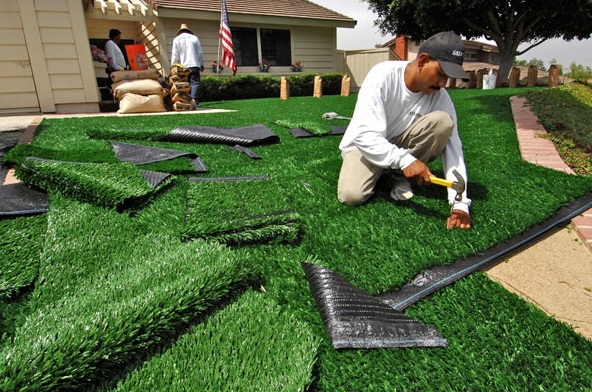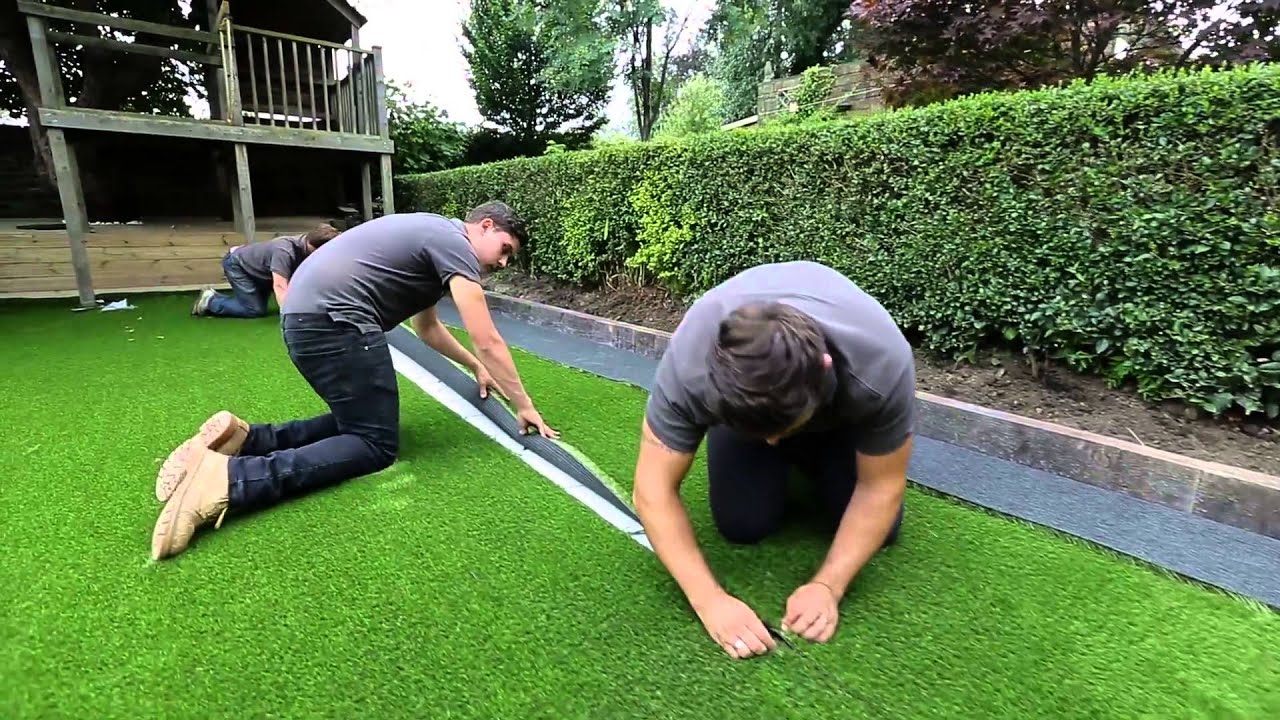High-Quality Arizona Turf Installation Solutions for Residences and Businesses
High-Quality Arizona Turf Installation Solutions for Residences and Businesses
Blog Article
Delve Into the Environmental Advantages of Opting for Synthetic Grass Solutions
The adoption of man-made turf remedies presents an engaging chance to address pushing ecological difficulties. By dramatically minimizing water usage and lessening the application of damaging chemicals, these options not just promote lasting landscaping however likewise protect regional ecological communities.
Water Conservation Benefits
Among one of the most considerable advantages of artificial lawn is its ability to save water. Traditional turf yards call for significant irrigation, specifically in areas vulnerable to drought or water limitations. In comparison, fabricated turf does not require watering, considerably decreasing the overall need for water sources. This feature is especially beneficial in deserts where water deficiency is a pushing problem.
By getting rid of the need for regular watering, synthetic grass adds to lasting landscape practices and aids mitigate the ecological effect of too much water usage. Moreover, the conservation of water includes the decrease of runoff, which can bring about soil erosion and waterway contamination.
In addition, the setup of synthetic grass enables property owners and towns to designate water sources much more efficiently, concentrating on vital uses such as alcohol consumption water and farming. The shift in the direction of man-made grass not just advertises accountable water usage however likewise straightens with broader environmental objectives aimed at maintaining natural deposits.
As areas significantly prioritize sustainability, the water conservation advantages of synthetic grass provide an engaging instance for its fostering in commercial and household landscaping projects.
Lowered Chemical Usage
The shift to synthetic grass considerably decreases the reliance on chemical therapies frequently made use of in natural lawn upkeep. Typical turf administration usually entails the application of fertilizers, chemicals, and herbicides to promote growth and control parasites. These chemicals can position risks to human health and wellness, neighborhood wild animals, and the setting, contributing to dirt and water contamination.
On the other hand, artificial lawn gets rid of the requirement for these dangerous substances. Once set up, it needs very little upkeep, mainly consisting of regular cleansing and occasional infill replenishment. This decrease in chemical usage not just profits the prompt environment however additionally adds to wider eco-friendly security. By lessening the launch of synthetic substances right into the community, fabricated lawn promotes healthier dirt and water systems.
In addition, the lack of chemical drainage related to synthetic grass installments helps protect neighborhood waterways from air pollution, sustaining aquatic life and keeping biodiversity. Artificial turf companies phoenix. As areas progressively focus on sustainable methods, choosing synthetic grass offers a practical service that aligns with ecological conservation goals. With this change, residential property proprietors can enjoy lavish eco-friendly rooms without endangering ecological health and wellness, leading the way for a much more lasting future
Lower Carbon Footprint

Furthermore, the installment of fabricated lawn can cause considerable water conservation. All-natural grass call for considerable amounts of water for irrigation, which not just includes in the carbon impact linked with water extraction and therapy however likewise pressures neighborhood water resources. On the other hand, synthetic grass requires minimal maintenance, requiring no watering, therefore significantly lowering water usage and its connected energy expenses.
Furthermore, the long life of fabricated turf contributes to its lower carbon influence. With a life-span of approximately 15 years or even more, the need for frequent replacements is lessened, resulting in much less waste and lower power consumption in manufacturing and dealing with conventional lawn choices. In general, synthetic grass provides a lasting option for ecologically conscious landscaping.
Environment Preservation
Habitat conservation is a critical factor to consider in the argument over landscaping selections, specifically when comparing artificial grass to natural lawn. Natural yard yards usually site link require extensive maintenance, including using herbicides, pesticides, and plant foods, which can detrimentally impact neighborhood communities. These chemicals can helpful resources leach into the dirt and rivers, hurting indigenous flora and animals and disrupting neighborhood environments.
On the other hand, synthetic grass offers a possibility to lower the ecological footprint of landscaping. By choosing artificial turf, property owners can minimize the disturbance of all-natural environments related to traditional yard treatment practices. Synthetic grass eliminates the need for harmful chemicals, consequently securing close-by wild animals and preserving the stability of bordering communities. In addition, the installment of synthetic lawn can result in the conversion of former yard locations right into even more biodiverse landscapes, such as pollinator yards or native plant locations, which can sustain local wildlife.
Eventually, the shift to fabricated lawn not just saves water and minimizes upkeep efforts yet likewise promotes an extra unified partnership in between human tasks and the native environment, promoting environment preservation while doing so.
Long-Term Sustainability
Long-term sustainability is an essential consider examining the benefits of synthetic grass over typical turf yards. One of the most significant benefits of synthetic grass is its resilience; it can last approximately 15-20 years with minimal upkeep, whereas natural lawn needs regular reseeding and substitute. This longevity minimizes the requirement for continuous resources, such as water, plant foods, and chemicals, which are important for maintaining a healthy and balanced turf lawn.
In addition, synthetic grass adds to a reduction in carbon exhausts connected with lawn care equipment. Standard yards frequently call for gas-powered mowers, trimmers, and blowers, every one of which add to air contamination. Phoenix turf companies. In comparison, man-made grass gets rid of the requirement for such equipment, advertising a cleaner setting
Furthermore, the production of fabricated lawn significantly uses recycled materials, enhancing its sustainability account. As makers take on environmentally friendly practices, the ecological impact of artificial turf remains to reduce.

Final Thought
The adoption of man-made grass options provides significant ecological benefits, consisting of considerable water conservation, reduced reliance on unsafe chemicals, and a reduced carbon footprint. Artificial lawn help in protecting natural habitats by reducing land disturbance and advertising long-term sustainability via the usage of long lasting products. Collectively, these aspects emphasize the potential of synthetic grass to add favorably to environmental wellness and offer a practical alternative to typical landscape design practices in a significantly resource-conscious globe.
In contrast, synthetic lawn does not need watering, dramatically minimizing the general need for water resources. By decreasing the release of artificial substances into the ecological community, synthetic lawn advertises healthier soil and water systems.
In addition, the installment of artificial turf can result in substantial water preservation. In contrast, fabricated grass requires very little maintenance, calling for no watering, thereby considerably decreasing water usage and its associated power expenses.

Report this page